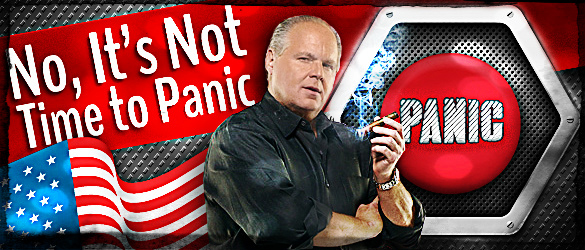RUSH: Here’s Brian in Tampa. I’m glad you called, Brian. I appreciate your patience in holding on as well.
CALLER: You bet, Rush. Hey, an EIB — or I should say EIB loyalist ever since September 1988. So giga dittos.
RUSH: Man, oh, man, you lifer. You’re a lifer.
CALLER: You betcha. From Florida’s West Coast. I never want parole, Rush. I am a lifer. From Florida’s West Coast, where we’re still anxiously awaiting hearing from the Justice Brothers on Black Lives Matter. But in the meantime, we at least have your fantastic impression of Hillary Rodham, and you do a terrific Savannah Guthrie as well. I don’t know anybody else doing Savannah Guthrie, so roll on, Rush. Hey, you’ve been telling us for decades now, “Don’t panic. I’ll tell you when to panic.” Well, what I want to know is what form should that panic take, and also what your criteria are for invoking this pandemonium?

CALLER: That’s the only way I would want you to take it, but if you want to get witty, please do.
RUSH: (laughing) Well, okay. But what I hear you saying is — you know what I thought he said? I can’t tell you what I thought he said. When he said, “If you want to get witty, please do,” I thought he said something began with an L instead of witty. I’m thinking, holy smokes, but nevertheless, what you’re asking me is, Rush, you have always told us when it’s time to panic. Is it time to panic? That’s essentially what you’re asking, right?
CALLER: No. I want to know how I — look, I’m not a prepper, but I want to be prepared for this. I want to know what form the panic should take. Guide us, please.
RUSH: In other words, you want to know what to do once you have panicked, what that actually will mean in terms of your behavior?
CALLER: You betcha.

And my answer is, it would appear that it’s time to panic, but I don’t think that it is. If panic means conceding that we’ve lost, then I’m not there. Many people — and I don’t mean this presidential race, I mean the country. I have always assumed that when people heard me say “I’ll tell you when it’s time to panic,” that many of them might have thought I’ll tell you when I think we’ve lost the country, meaning there’s no point in fighting on. So, Rush, you tell us when we’ve reached that point, because then we’ve gotta obviously change the way we live and look at things.
And I don’t think it’s that time. At least I’m not ready to concede that we’ve lost the country. I don’t know because of my makeup that I will ever actually get to a point where I want to stand down and just let ’em have it. I don’t know that I’m ever gonna get to the point where I say to myself, “You know what, folks? We don’t have any hope now. The only hope we’ve got is if this whole thing falls apart and implodes on everybody and everybody’s miserable, everybody loses everything, and we start anew.”
We’re not near that yet. Some people think we are. But I don’t. Because I actually believe — I really do. I’m Reaganesque in this. I think that immorality on a large-scale will ultimately implode on itself. Now, Reagan offered that belief about communism, and specifically the Soviet Union. He was adamant that something as immoral and heinous as Soviet communism could survive. At some point it would destroy itself because it would eat itself alive, it would destroy the food chain, i.e., the people necessary to sustain it. It just couldn’t last and survive.


Now, the behavioral patterns that should accompany a panic — panic, if you think, “Hey, we better all get serious or we’re gonna lose this,” we are at that point. Whether panic is what’s called for is another thing, but the behavioral aspects of that, well, that’s easy. But I’m out of time at the moment.



